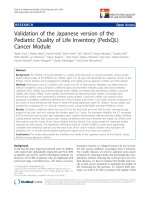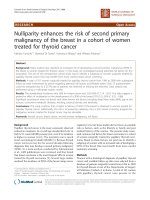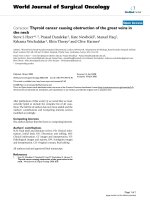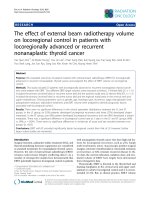THE PEDIATRIC PAPILLARY THYROID CANCER
Bạn đang xem bản rút gọn của tài liệu. Xem và tải ngay bản đầy đủ của tài liệu tại đây (1.06 MB, 15 trang )
THE PEDIATRIC PAPILLARY THYROID
CANCER
BS Nguyễn Tuấn Cường
MEDIC
IN GENERAL
Pediatric thyroid cancer is a rare and treatable disease with an excellent
prognosis, Papillary thyroid cancer (PTC) accounts for the vast majority
of cases.
In children: <10 years of age, the incidence: 1 per 1,000,000. From 10 to
14, the incidence: 1 per 200,000.
IN GENERAL
Compared with adults, children with PTC present with more extensive
disease, at more advanced stages and is associated with higher rates of
recurrence, yet mortality rates are low.
Lymph node involvement: 40–90% of children, compared with 20–50% of
adults.
The prevalence of distant metastases, most commonly lung, is 15–30% in
children vs. 2% in adults.
Multifocal disease is more common in children than adults: about 40%.
Fortunately, even in the presence of metastatic disease, long-term followup data show 30-year survival rates of 90–99% for children.
CASE 1
MALE, 11YS
DETECTED GOITER ON THE LEFT FOR 1 WEEK
CASE 1
CASE 2
FEMALE, 14 YS
DETECTED GOITER FOR 10 DS
CASE 2: OPERATED ON 24/01/2024
DIAGNOSIS
Risk Factors for Thyroid Cancer in Children:
Head and neck irradiation. The incidence of DTC increases linearly with
radiation doses up to 30 Gy, (3,000 cGy or Rad) and declines with higher
doses.
Thyroid cancer in children can also be observed in families: A calcitonin level
may be measured to screen for medullary thyroid cancer, which accounts for
3–5% of pediatric thyroid cancers.
DIAGNOSIS
ULTRASOUND + FNAC
The predictive value of the Bethesda system for pediatric thyroid nodules:
the risk of malignancy may be higher in children than adults when cytology
is Bethesda criteria III or IV.
TREATMENT
1. Total thyroidectomy and central compartment lymph node dissection are
the surgical procedure of choice for DTC.
2. RAI is favored in children with DTC and lymph node involvement:
+ should be assumed to have micrometastases.
+ to ablate residual disease and reduce the risk of disease recurrence.
+ 1.5–3 mCi/kg, distant metastases and recurrent disease: up to 5 mCi/kg .
+ TSH levels >30 mU/L appear to be adequate to stimulate 131I uptake in
thyroid remnants and functional metastatic lesions:
T4 medication should be discontinued 2–3 weeks before RAI.
low-iodine diet: 2ws.
water-soluble intravenous contrast agents: 4ws.
TREATMENT
+ Evidence also suggests that relatively high doses of 131I may contribute to
an increased risk of SPMs (secondary primary malignancies).
3. Levothyroxine Therapy: standard practice, TSH suppression can reduce
rates of recurrence. TSH levels should be maintained:
<0.1 mU/L: extensive lateral nodal or distant metastatic disease.
0.1–0.5 mU/L: intermediate risk or recurrence.
0.5–1.0 mU/L: minimal or no lymph node involvement.
+ be relaxed after several years of follow-up with no evidence of disease
progression or recurrence: most recurrent DTC develops within 5 years after
initial treatment.
FOLLOW-UP
+ Ultrasound and TSH-suppressed Tg level assessment is recommended
every 3–6 months.
+ Ultrasound: not only focus on the thyroid bed, but encompass the neck in
full, examining each lymph node compartment.
Children commonly have infection-related lymphadenopathy.
FNAC: persistent or enlarging lymph nodes or lymph nodes with abnormal
characteristics: loss of hilum, a round rather than oval shape, and/or
calcification.
Tg levels should be assessed in lymph node aspirates.
FOLLOW-UP
+ at select times, whole-body radioiodine scans:
based on concern for persistent or recurrent disease using US and/or Tg results.
especially useful in the detection of lung metastases that are not apparent by
chest radiographs or CT scanning.
CONCLUSION
2 CASES: suddenly detected goiter.
Regularly health check-up.
+ Pediatric thyroid cancer is a rare and treatable disease with an excellent
prognosis.
+ Total thyroidectomy and central compartment lymph node dissection.
+ RAI.
+ Levothyroxine Therapy.
It is important that pediatric DTC be managed by physicians with expertise in
this area.
REFERENCES
Management of Thyroid Nodules and Differentiated Thyroid Cancer, Sanziana A. Roman
Julie Ann Sosa, Carmen C. Solórzano
The Thyroid and Its Diseases_A Comprehensive Guide for the Clinician, Markus Luster
Leonidas H. Duntas, Leonard Wartofsky
Thyroid Cancer_Advances in Diagnosis and Therapy, Hojjat Ahmadzadehfar
Thyroid Disorders_Basic Science and Clinical Practice, Syed Khalid Imam, Shamim I. Ahmad









